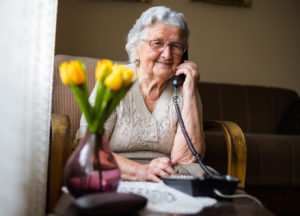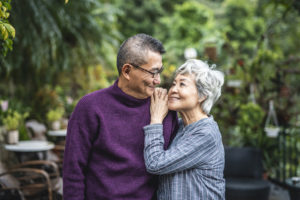I’d like to pay homage to Gabriel Garcia Marquez, whose emblematic themes published back in 1985 described the fear and intolerance often attached to love, sex, and aging. Reflecting on these themes today is critical as we consider the serious effects of COVID-19, with physical distancing and those most vulnerable to the disease. What can we offer to older adults concerned about sexual connection during this period?
Social isolation or spatial distancing

Generally, when things are bad, we look to our friends and families for comfort and support. But this time, we are being asked to stay away from each other. For aging adults who live alone or away from family, distancing presents a new challenge for our senior centers, gerontological health clinicians, and senior living administrators hard at work combating the effects of isolation. Shutting down community centers, curtailing group interactions, and asking people to intentionally stay in their homes and apartments with no visitors can be anxiety-producing and depressing for many. Social isolation is the public health standard to help stop the coronavirus. I prefer to call it spatial distancing and I want to offer some tips on how to stay connected and stay safe while distancing from the virus.
Anxiety and Your Immune System
It’s high anxiety time. Stressful to watch the news. It can get frightening, even without a global pandemic. But now, it feels even more frightening. I had to stop getting notifications from my favorite news sources on my cell phone because I was getting too nervous. Anxiety and stress can weaken our immune systems. Researchers in the field of psychoneuroimmunology have shown that our state of mind affects our state of health. Feeling lonely, depressed, or stressed? The body’s ability to fight off viral infections is constrained when under stress and researchers have found that behavioral interventions can produce positive changes.
With Stress, It’s about Duration, not Severity
A meta-analysis of over 300 research studies indicated a relationship between psychological stress and immune system responses. When people were stressed for just a few minutes, researchers found a burst of “first responder” activity. When the duration of the stress increased (for a few days or a few weeks), the entire immune system’s ability to fight off disease declined. Physical vulnerability as a function of age or disease also increased vulnerability to these stressors. The key factor was duration, not severity. A 2002 study found that older people who are already sick are more susceptible to stress-related immune responses. Immune responses are most weakened by a combination of loneliness and small social networks.
Immune System Benefits of Sexual Expression

In 2007, a handful of well-established sexuality researchers from the Society for the Scientific Study of Sexuality embarked on a large-scale investigation to answer questions about the health effects of sexual expression. Among other positive health effects, they found that sexual activity can bolster the immune system. When sexuality researchers asked why people have sex, the key reason was not about love or procreation, it was more often about a physical need to reduce stress.
What We Know About COVID-19
This brings us to our current dilemma. If sex is good for us but we are being asked to spatially distance ourselves from other people, what can we offer our staff, residents, and families who still want to experience sexual pleasure?
First of all, know how the virus spreads: This coronavirus is a respiratory disease that spreads from someone who has it through direct contact with their saliva or mucus. What we know about the virus and sex comes primarily from epidemiologists who have studied this particular virus:
- COVID-19 has been found in feces of people who are infected with the virus
- COVID-19 has not yet been found in semen or vaginal fluid
- We know that other coronaviruses do not efficiently transmit through sex
Safer Sex and COVID-19
Here is the most up-to-date information for you, your clients, your patients, and your residents:
- Your safest sex partner is you. Masturbation will not spread COVID-19, especially if you wash your hands (and your sex toys) before and after.
- Your next safest partner is someone you live with, your HSP (Household Sex Partner). Having close contact – including sex – with only a small circle of people helps contain the virus. Avoid having sex with people outside of your HSP.
- What if you’re having sex with multiple people who don’t all live with you? Now is not the time to be taking sexual risks with multiple people. Now is the time to sit down with everyone you are having sex with and think about how many people each of them is in contact with. How many people do you want to be potentially exposed to?
- If you usually meet your partners online, take a break from in-person dates. Try video dates, sexting, chat rooms, phone sex, or virtual reality sex instead.
Take Care of Yourself
- Kissing can easily pass COVID-19. Avoid kissing anyone outside of your HSP.
- Condoms and other barrier protection can reduce potential contact
- Washing up before and after sex is more important than ever (remember 20 seconds, with soap). Wash your hands and any props or toys.
- Skip sex if your partner is not feeling well – especially kissing – or if you are not feeling well or if your or your partner has a medical condition like lung disease, heart disease, diabetes, cancer, or a weakened immune system.
Although these are unprecedented and stressful times, keeping your immune system intact can be a blessing for you as an older adult. Find a way to continue to have pleasure, even during the pandemic. If you can have sex safely and boost your immune system, it may even improve the quality of your life.


 Dr. Jane Fleishman
Dr. Jane Fleishman